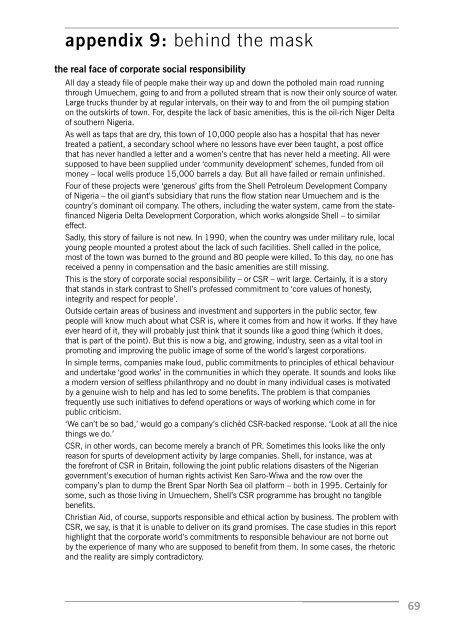Cost of coffee.indd - RISC
Cost of coffee.indd - RISC
Cost of coffee.indd - RISC
Create successful ePaper yourself
Turn your PDF publications into a flip-book with our unique Google optimized e-Paper software.
appendix 9: behind the mask<br />
the real face <strong>of</strong> corporate social responsibility<br />
All day a steady file <strong>of</strong> people make their way up and down the potholed main road running<br />
through Umuechem, going to and from a polluted stream that is now their only source <strong>of</strong> water.<br />
Large trucks thunder by at regular intervals, on their way to and from the oil pumping station<br />
on the outskirts <strong>of</strong> town. For, despite the lack <strong>of</strong> basic amenities, this is the oil-rich Niger Delta<br />
<strong>of</strong> southern Nigeria.<br />
As well as taps that are dry, this town <strong>of</strong> 10,000 people also has a hospital that has never<br />
treated a patient, a secondary school where no lessons have ever been taught, a post <strong>of</strong>fice<br />
that has never handled a letter and a women’s centre that has never held a meeting. All were<br />
supposed to have been supplied under ‘community development’ schemes, funded from oil<br />
money – local wells produce 15,000 barrels a day. But all have failed or remain unfinished.<br />
Four <strong>of</strong> these projects were ‘generous’ gifts from the Shell Petroleum Development Company<br />
<strong>of</strong> Nigeria – the oil giant’s subsidiary that runs the flow station near Umuechem and is the<br />
country’s dominant oil company. The others, including the water system, came from the statefinanced<br />
Nigeria Delta Development Corporation, which works alongside Shell – to similar<br />
effect.<br />
Sadly, this story <strong>of</strong> failure is not new. In 1990, when the country was under military rule, local<br />
young people mounted a protest about the lack <strong>of</strong> such facilities. Shell called in the police,<br />
most <strong>of</strong> the town was burned to the ground and 80 people were killed. To this day, no one has<br />
received a penny in compensation and the basic amenities are still missing.<br />
This is the story <strong>of</strong> corporate social responsibility – or CSR – writ large. Certainly, it is a story<br />
that stands in stark contrast to Shell’s pr<strong>of</strong>essed commitment to ‘core values <strong>of</strong> honesty,<br />
integrity and respect for people’.<br />
Outside certain areas <strong>of</strong> business and investment and supporters in the public sector, few<br />
people will know much about what CSR is, where it comes from and how it works. If they have<br />
ever heard <strong>of</strong> it, they will probably just think that it sounds like a good thing (which it does,<br />
that is part <strong>of</strong> the point). But this is now a big, and growing, industry, seen as a vital tool in<br />
promoting and improving the public image <strong>of</strong> some <strong>of</strong> the world’s largest corporations.<br />
In simple terms, companies make loud, public commitments to principles <strong>of</strong> ethical behaviour<br />
and undertake ‘good works’ in the communities in which they operate. It sounds and looks like<br />
a modern version <strong>of</strong> selfless philanthropy and no doubt in many individual cases is motivated<br />
by a genuine wish to help and has led to some benefits. The problem is that companies<br />
frequently use such initiatives to defend operations or ways <strong>of</strong> working which come in for<br />
public criticism.<br />
‘We can’t be so bad,’ would go a company’s clichéd CSR-backed response. ‘Look at all the nice<br />
things we do.’<br />
CSR, in other words, can become merely a branch <strong>of</strong> PR. Sometimes this looks like the only<br />
reason for spurts <strong>of</strong> development activity by large companies. Shell, for instance, was at<br />
the forefront <strong>of</strong> CSR in Britain, following the joint public relations disasters <strong>of</strong> the Nigerian<br />
government’s execution <strong>of</strong> human rights activist Ken Saro-Wiwa and the row over the<br />
company’s plan to dump the Brent Spar North Sea oil platform – both in 1995. Certainly for<br />
some, such as those living in Umuechem, Shell’s CSR programme has brought no tangible<br />
benefits.<br />
Christian Aid, <strong>of</strong> course, supports responsible and ethical action by business. The problem with<br />
CSR, we say, is that it is unable to deliver on its grand promises. The case studies in this report<br />
highlight that the corporate world’s commitments to responsible behaviour are not borne out<br />
by the experience <strong>of</strong> many who are supposed to benefit from them. In some cases, the rhetoric<br />
and the reality are simply contradictory.<br />
69




